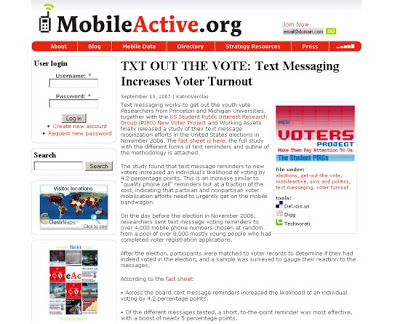SMS e aumento da participação nas eleições

Abaixo alguns trechos da matéria publicada no MobileActive.
"He study found that text message reminders to new voters increased an individual’s likelihood of voting by 4.2 percentage points. This is an increase similar to "quality phone call" reminders but at a fraction of the cost, indicating that partisan and nonpartisan voter mobilization efforts need to urgently get on the mobile bandwagon.
On the day before the election in November 2006, researchers sent text message voting reminders to over 4,000 mobile phone numbers chosen at random from a pool of over 8,000 mostly young people who had completed voter registration applications.
After the election, participants were matched to voter records to determine if they had indeed voted in the election, and a sample was surveyed to gauge their reaction to the messages.
According to the fact sheet:
• Across the board, text message reminders increased the likelihood of an individual voting by 4.2 percentage points.
• Of the different messages tested, a short, to-the-point reminder was most effective, with a boost of nearly 5 percentage points.
• In a follow up survey, 59% of recipients reported that the reminder was helpful, versus only 23% who found it bothersome.
• Hispanics had especially positive feelings about the reminders.
• At just $1.56 per additional vote generated, text messaging was extremely cost effective in comparison to other methods.
- Empresa Lança Mobile Games Educativos Sobre Mudanças Climáticas
A ZMQ Software Systems lançará nos próximos meses mais jogos móveis com o objetivo de educar as pessoas sobre as alterações climáticas. A nova linha de produtos faz parte do projeto Connect2Climate, que pretende utilizar as tecnologias móveis...
- Marketing Político Móvel
Hoje à tarde na reunião do Grupo de Pesquisa em Cibercidade (GPC) discutimos um artigo de Júlio Valentim sobre Comunicação Móvel e eleições: o uso das tecnologias digitais móveis em campanhas eleitorais. Um dos tópicos tratados no artigo foi...
- Mensagens De Texto E Campanhas Civis Da Sociedade
O uso cada vez maior de SMS para organização e mobilização em campanhas promovidas por ONGS e entidades civis deve-se à grande penetração dos celulares nas diversas sociedades do globo. Entretanto, mesmo com um alcance maior que a internet, o...
- Celular E Ativismo Social
Um artigo publicado em junho no Blog TechSoup trata do uso do celular na organização do ativismo social. Na minha pesquisa, analiso de que forma as novas tecnologias digitais móveis, especialmente o celular, trazem transformações na coordenação...
- Ao Vivo Direto Do Celular
Acabo de ler um artigo bastante interessante de Darren Waters, do blog dot.life, da BBC. Ele aborda em Going live from mobile uma tecnologia desenvolvida pela empresa do Vale do Silício Qik que permite a transmissão em streaming (tempo real) a partir...
